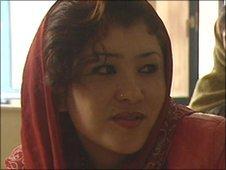Afghan Women Languish In Prison For Crimes Against Morality
 It has something to do with the way she wears her red tunic and trousers, her short cropped black leather jacket, and the way she chews gum and rolls her eyes.
It has something to do with the way she wears her red tunic and trousers, her short cropped black leather jacket, and the way she chews gum and rolls her eyes."What are you here for?" I ask as we sit in a makeshift beauty parlour, surrounded by a group of Afghan women in less flamboyant attire.
"Should I tell her?" she asks the other women with a mischievous grin.
"Bad character," she says after a moment's hesitation. She suppresses a giggle then doubles over with laughter. Everyone giggles with her.
Sorarya doesn't explain what that means. But almost every woman in this room has been accused of "bad character" of one kind or another.
Missing school
We are sitting in Badam Bagh, or Almond Garden, Afghanistan's only prison for women in the capital Kabul.
The prison is a window on a world where, outside these walls, women are constantly judged against a standard that makes many of their stories difficult to fathom.
Sixteen-year-old Sabera, with a pretty yellow head scarf, frets that she is missing school.
"I was about to get engaged, and the boy came to ask me himself, before sending his parents. A lady in our neighbourhood saw us, and called the police," she explains.
She was sentenced to three years but, in an act of mercy, it was shortened to 18 months.
Fellow inmate Aziza was accused of running away from her husband. She says she was acquitted two months ago, but still languishes in prison.
A senior official in Afghanistan's Ministry for Women's Affairs told a recent UN workshop that about half of Afghanistan's 476 women prisoners were detained for "moral crimes".
That includes everything from running away from home, refusing to marry, marrying without their family's wishes, and "attempted adultery".
"In many cases women run away because they can't bear the domestic violence and then they are picked up and taken into custody for a long time," explains Nader Nadery, a commissioner at Afghanistan's Independent Human Rights Commission.
Click here for the full story:
By Lyse Doucet
BBC Newsnight
Related Links:
More About Afghanistan on AWR
"I was about to get engaged, and the boy came to ask me himself, before sending his parents. A lady in our neighbourhood saw us, and called the police," she explains.
She was sentenced to three years but, in an act of mercy, it was shortened to 18 months.
Fellow inmate Aziza was accused of running away from her husband. She says she was acquitted two months ago, but still languishes in prison.
A senior official in Afghanistan's Ministry for Women's Affairs told a recent UN workshop that about half of Afghanistan's 476 women prisoners were detained for "moral crimes".
That includes everything from running away from home, refusing to marry, marrying without their family's wishes, and "attempted adultery".
"In many cases women run away because they can't bear the domestic violence and then they are picked up and taken into custody for a long time," explains Nader Nadery, a commissioner at Afghanistan's Independent Human Rights Commission.
Click here for the full story:
By Lyse Doucet
BBC Newsnight
Related Links:
More About Afghanistan on AWR